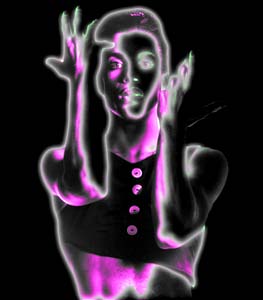![[Metroactive Music]](/music/gifs/music468.gif)
![[Metroactive Music]](/music/gifs/music468.gif)
[ Music Index | Metro | Metroactive Central | Archives ]
Princely Sums
 The Artist scraps scalpers at Event Center
The Artist scraps scalpers at Event Center
By Gina Arnold
TWO DAYS before its scheduled start time, the Artist Formerly Known as Prince canceled his April 12 show at the San Jose Event Center. At a press conference last Friday, his manager, Billy Sparks, cited concern about ticket scalping as the reason and promised that the Artist would reschedule his San Jose appearance "very soon," with tighter controls on ticket sales. Sparks said that the Artist's extreme worry about ticket scalping forced him to cancel other tour dates in January of this year. "That's why we can't play tomorrow. It wouldn't be right to do it after all we've been through. We weren't trying to come here and sell out in 10 minutes, and then have the fans shut out. [To] have people tack on 300, 400 percent on the ticket price--that's not right." Although tickets for the Artist show--his first here in years--sold out in seven minutes, there was some question whether the scalping activity around this show was larger than usual. Lee Smith, a representative for Bill Graham Presents, the show's producer, estimated that 510 percent of the total 7,000 tickets sold were in the hands of scalpers. What was unusual, he added, was the cost of tickets: up to $300, some said. When asked how the Artist knew there was so much scalping going on, Sparks said, "We have a Web site, and the Web site was going stupid. We got hundreds of hundreds of detections." Smith said that when the Artist returns, BGP will institute a voucher system whereby potential ticket buyers will have to fill out a form and show ID in order to purchase tickets. On the day of the show, they will have to show ID again in order to prove that they are the purchaser before they are allowed to enter the building. This type of system was used for a recent Eric Clapton concert at the Fillmore, Smith said. But the Event Center would be the largest venue to implement the highly unwieldy system. Sparks added that when the Artist returns, he plans to drop the ticket price from $50 to $40. "The Artist has lost money and credibility to do this--to say this is not right and must stop," added Sparks. "We'll come back and play when we've got the correct people in the auditorium." When asked if a change in venue was possible, Sparks replied, "For my money, we're coming back to San Jose. We're not going to let anybody run us out of town. ... We're coming back and it's going to be a better day." Fans can get refunds for their Artist tickets at the place of purchase; there will be no exchanges for tickets to the rescheduled show. Scalping is not a new phenomenon at popular Bay Area concerts, and unfortunately, according to BGP spokesperson Jerry Pompili, in California it is only illegal to resell a ticket on the grounds of the facility where the concert is taking place. In 1991, BGP made an attempt to get anti-scalping laws tightened in California, but the proposed legislation didn't pass. Now, concert promoters like BGP and ticket companies like BASS try to limit scalping by imposing a six-ticket maximum on buyers, but there are various ways in which ticket brokers get around this restriction--for instance, by stacking ticket-company lines with hired homeless people who buy tickets on commission. Another way that ticket brokers are able to get extra tickets is through season-ticket holders and series subscribers, who are able to get better seats by buying early and in bulk, but then unload tickets for unwanted shows to the brokers. [ Metro | Metroactive Central | Archives ]
| ||||||||||||||||||||||||||||||
This page was designed and created by the Boulevards team.
Copyright © 1997 Metro Publishing, Inc.